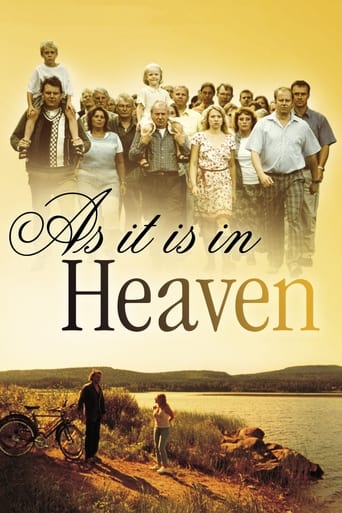Flyerplesys
Perfectly adorable
Konterr
Brilliant and touching
Breakinger
A Brilliant Conflict
WillSushyMedia
This movie was so-so. It had it's moments, but wasn't the greatest.
writetracy
This film is unusual and inspiring. It tells a story of loss and grief that is healed through connecting with others - finding a community.
przgzr
First: I really liked this movie, though I don't find it one of three or five best Swedish movies. But any among twenty best Swedish movies is better than top three of most other countries.Nothing is perfect, including movies. However, I find some objections from other comments not important or completely mistaken.It is true that people in the village (in choir or out of it) show a great range of different characters. It is true that they can be described as clichés. But this is not unrealistic. I wonder how many of these comments have been written by people who live and know the life in distant, separated villages. It is normal that you find very different people there, on one place. In big cities (where most of IMDb critics live) so different people usually don't appear together, they tend to be in groups with people of similar interests, education, social status, hobbies etc etc. In small villages people are rather unique, they can't be in groups with similar people because there are no similar ones, so any group contains different characters. Which can more or less look like clichés.Sweden, as other Nordic countries, really pays big attention to home violence. But distant villages are again world of its own. Have you seen any policeman in the movie? We don't know how far away is the closest police station. Village lives their tradition rules and law. That's why Gabrielle stays longer with Connie than most city woman would. And it's not illogical to expect a person who was able to suffer and bare Connie for so many years to do what she has done when he finally had to face the law. Despite a comment that finds it unbelievable, people who are still more bound to tradition than to modern trends still have some ability of forgiveness, something that's unpopular and almost extinct in our culture. But if we look in books or movies made few decades ago, this wasn't such a rare and unbelievable characteristic, so it can still appear in traditional, especially religious communities.What me leads to final and most important reason why I wrote this comment.This is an deeply religious movie, and it must have been done either by a deeply religious or complete atheistic author. It rejects the cold, heartless demagogy and extreme pharisee-ism of narrow-minded fundamentalists that seem to be trapped in Old Testimony, and shows the expression of life and faith that can be reached once given a freedom and love (one that New Testimony offers). Such a devotedness to one final aim, closing circles of his life and simultaneously rotating in a spiral to its top, achieving the final point, the climax of his life, fulfilling everything he was living for...That's why I can understand how somebody compared Daniel to some kind of Jesus. However, I don't see him as Jesus. David isn't sinless, sometimes he has hidden motives and isn't free of manipulation and vanity. But I can compare him to St Peter. His faith/devotion isn't equally strong all the time - something like Peter's when he denied Jesus. Jesus ended his life on Earth on the top of the mountain, while Daniel's death in the basement looks more like St Peter's crucified upside-down on a Roman square, now basement of St Peter's Basilica. And Daniel's work looks more like following Jesus' words to Peter: "you are Peter (Petros), and on this rock I will build my church": he had his work done, he was a rock firm basement of the choir that doesn't seem to be turned to dust after Daniel's death.However, Daniel's devotion was not to faith or God but to art. On the other hand, he finds his fulfillment through church choir and the more we follow his work, the more we see that he accepts religious music to achieve his aim. So it is up to each of us to interpret if it is music and art, or it is faith and God that fulfills one's life as the final and eternal aim. And this is why, depending on the premise, I can't tell if the authors are truly religious or completely atheistic persons. But no matter what is in their hearts and soul, their movie is a true art that gives us freedom to chose for ourselves.
heistad-933-254808
As it is in Heaven is like a melancholy Little Miss Sunshine for Swedes. Quirky and heartwarming, this film follows a small town with a big heart, as its residents find their individual voices and learn to live together in harmony. The story unfolds when world-renowned conductor, Daniel Dareús—who is exhausted by his high-stress career—returns to his childhood village and discovers how a small-town community can heal an aching heart. Daniel becomes the church choir director and his passion for music soon inspires the townspeople to confront the intense emotions they have repressed for years. And as these singers embrace their unique tones, Daniel too has to find how he fits into the chorus. Addressing issues of physical and emotional abuse, sexual subjugation, and the human tendency towards passivity, director Kay Pollak investigates in this internationally acclaimed film what it really means to be a community. It is clear from the get-go that Daniel is exceptional. The opening scene is of him as a young boy, playing the violin in a golden field. As his bow strikes the strings, however, we see that his musical talent earns him nothing more than some nasty bruises and a reputation as a wimp. Daniel leaves his hometown and its bullies, and eventually establishes himself in the world of music as a hugely successful conductor. But when he suffers a severe heart attack that puts an abrupt end to his remarkable career, Daniel decides to return to very place that had nearly squelched his dreams as a boy. Played by the superb Michael Nygvist, Daniel is a captivating mixture of bewildered, awkward, mysterious and compassionate. When he meets the vivacious, outspoken young woman named Lena (Frida Hallgren), who seems his exact opposite, his lingering stare and clumsy smile captivate her attention as well. While Daniel navigates his new position as Vespor, Lena helps him to connect with the people, reminding him when he is frustrated by interruptions during rehearsal that "coffee is important too." While Daniel becomes more and more engaged with the choir, the minister, Stig (Niklas Falk), feels increasingly ostracized by his congregation. Through Stig's character, Pollak brings up questions about the command of organized religion over people's lives. For example, despite his wife's assurance that sexual desire is natural, Stig condemns it as a sinful act. His wife, Inger (Ingela Olsso), therefore, has had to suffer a life of sexual subjugation. As the choir evolves, Inger finds a sense of freedom and happiness form it that she have in her marriage, which leads Stig to criticize Daniel for using unconventional methods. Realizing that her husband is using religion to oppress her and the rest of the choir, Inger shouts, "there is no sin!" She denounces him, and thus the Christian Church, for trapping Christians in a perpetual state of guilt by "handing out sin with one hand and offering redemption with the other."Gabriella (Helen Sjöholm), like Inger, finds her voice through the enlivened choir. Married to an abusive husband, Gabriella has endured years of feeling afraid and helpless. Daniel writes a song entitled "Gabriella's Song" to sing at the concert: a dangerous act, seeing as her husband disapproves of her doing anything independent. When the moment arrives, her performance is stunning; she appears empowered and full of life for the first time in the film. The song itself tells Gabriella's story, as the solo line embraces her courageous spirit, and the chorus part, like the members of the choir, supports her in her journey. Transformed, Gabriella finally leaves her husband and the townspeople cease to be passive bystanders to her husband's crimes. As they open up to one another, the choir becomes its own congregation and the music their way of worship. However, though Daniel appears to be the minister of their spiritual community, he himself has yet to find his own voice. Lena challenges him to release his inhibitions and be vulnerable—something that his position as a world celebrity never allowed him to do. His timidity juxtaposed with Lena's boldness makes for a charming romance: yet another way in which one can learn to trust their voice and, ultimately, strengthen the voice of the community. Because As it is in Heaven is, after all, a love story: a story of how loving others makes someplace home.
susannettashop
This review only contains spoilers in the sense of offering an interpretation of the film. You must work hard to make my summary fit the plot of the film. The charismatic stranger who comes to a tiny, isolated town in Northern Sweden where he had been bullied as a child is a burnt out orchestral conductor. In this nameless town, the Church is so corrupt and out of touch as to be utterly lawless. Daniel succeeds in getting the small church choir there to sing the music of heaven, but at the same time destroys all the useful hierarchies. More importantly perhaps, he falls in love. The title, which comes from the Lord's Prayer, is only the first indication that the film is held together with strong Christian symbolism. Like Christ, Daniel is surrounded by good and bad women and betrayed by one of his disciples. Like Christ, he dies once to meet his maker and rise again as his believers convert all who listen to them.Despite its religo-didactic character, As it is in Heaven is a well made film with psychologically believable characters, sensitive acting and photography, and an apt representation of what it is like to learn how to make and perform vocal music. The marital close-ups will remind you of Portraits of a Marriage.

